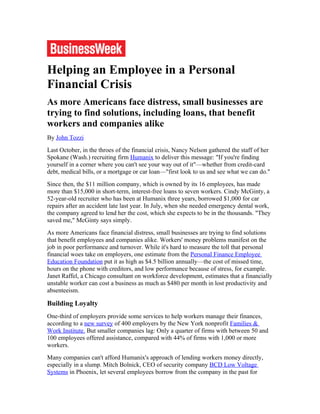
Business Week Helping An Employee In A Personal Financial Crisis
- 1. Helping an Employee in a Personal Financial Crisis As more Americans face distress, small businesses are trying to find solutions, including loans, that benefit workers and companies alike By John Tozzi Last October, in the throes of the financial crisis, Nancy Nelson gathered the staff of her Spokane (Wash.) recruiting firm Humanix to deliver this message: "If you're finding yourself in a corner where you can't see your way out of it"—whether from credit-card debt, medical bills, or a mortgage or car loan—"first look to us and see what we can do." Since then, the $11 million company, which is owned by its 16 employees, has made more than $15,000 in short-term, interest-free loans to seven workers. Cindy McGinty, a 52-year-old recruiter who has been at Humanix three years, borrowed $1,000 for car repairs after an accident late last year. In July, when she needed emergency dental work, the company agreed to lend her the cost, which she expects to be in the thousands. "They saved me," McGinty says simply. As more Americans face financial distress, small businesses are trying to find solutions that benefit employees and companies alike. Workers' money problems manifest on the job in poor performance and turnover. While it's hard to measure the toll that personal financial woes take on employers, one estimate from the Personal Finance Employee Education Foundation put it as high as $4.5 billion annually—the cost of missed time, hours on the phone with creditors, and low performance because of stress, for example. Janet Raffel, a Chicago consultant on workforce development, estimates that a financially unstable worker can cost a business as much as $480 per month in lost productivity and absenteeism. Building Loyalty One-third of employers provide some services to help workers manage their finances, according to a new survey of 400 employers by the New York nonprofit Families & Work Institute. But smaller companies lag: Only a quarter of firms with between 50 and 100 employees offered assistance, compared with 44% of firms with 1,000 or more workers. Many companies can't afford Humanix's approach of lending workers money directly, especially in a slump. Mitch Bolnick, CEO of security company BCD Low Voltage Systems in Phoenix, let several employees borrow from the company in the past for
- 2. emergencies like car repairs. But with sales slow this year and his staff of 16 already taking pay cuts, Bolnick has held off on new loans. "This year we've had to explain to them what the situation is and why, and they understand," he says. Still, he says assisting employees when possible helps BCD build loyalty among workers: Two have told him they turned down higher-paying offers. What can small businesses do to help employees in crisis? Some efforts come from workers themselves. Staff at CRSA, a 61-employee architecture firm in Salt Lake City, began a "We-Care Fund" five years ago to raise money for a colleague who had a premature baby. Funded through voluntary payroll deductions, the account typically has $3,500 that can be drawn on for workers' medical emergencies or other urgent needs. Most employees contribute a few dollars each pay period, and a staff committee reviews applications. Other programs, particularly for low-income workers, try not only to help them out of immediate binds but encourage them to manage their money better over time. Four years ago, the eastern Kentucky nonprofit Mountain Association for Community & Economic Development began hearing from companies that workers needed advance loans. "My cash flow's in chaos because employees come to me wanting advances and never pay me back," one employer told Larrey Riddle, MACED program director. That, along with the growing number of payday lenders in Appalachia—one opens every four days in Kentucky, according to the Brookings Institution—spurred MACED to develop The Save It! Loan program as a pilot two years ago. Workers at participating companies can borrow between $300 and $500 through the credit union. Borrowers qualify based on their income (between $12,000 and $60,000) and employment history, not their credit rating. The repayment is collected automatically from their paychecks over 10 months at 18% interest. The credit union also collects an amount equal to half the loan's principal and puts it in a savings account for the borrower, so employees automatically save as they repay their loan. The goal is to help workers build savings and keep them from the debt traps that payday loans often lead to. Eleven employers, with payrolls ranging from 20 to 400 workers, participated in the pilot, which made 385 loans worth about $120,000. Confidentiality Absent such innovative solutions, small companies can offer some support as a benefit through employee assistance programs (EAPs). Such programs generally cost a few dollars per employee per month, and offer confidential help for a range of issues, including domestic problems, addiction, and financial woes—a particular concern right now. Melanie Hardie, a senior financial consultant at Ceridian Lifeworks, says the number of calls her team gets about foreclosure has gone from one or two each week to four or more daily. About a quarter of Ceridian Lifeworks' business is from small accounts, which the company classifies as under 350 employees. "Most companies, small businesses or large businesses, don't have the qualified professionals in-house," says Hardie. "Really we're an extension of their human resources department." As the recession grinds on, more companies find themselves managing workers facing personal financial crisis. And while employers like Humanix treat workers like family, taking care of them makes business sense as well. "I don't want to make it Pollyanna,"
- 3. says Humanix's Nelson. "If an employee has a stressful financial situation at home, they're not going to be fully engaged in their job." Tozzi covers small business for BusinessWeek.com.